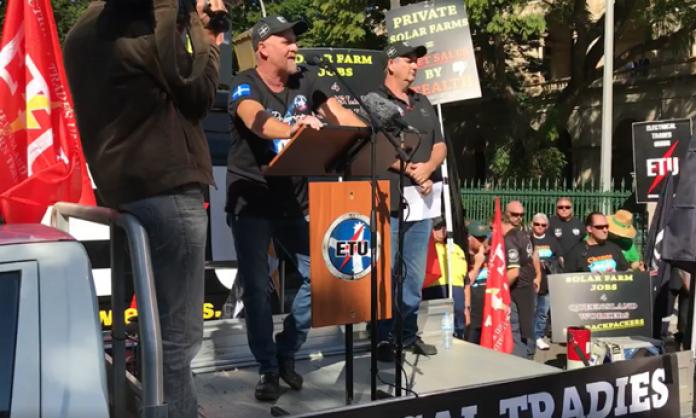It’s budget day in Queensland, and 2,000 electrical trades workers from across the state’s south east are rallying outside parliament. They are protesting what the Electrical Trades Union (ETU) calls the “privatisation by stealth” of the state’s electricity services.
The Palaszczuk Labor government had been consulting with the union about the creation of a state energy company, CleanCo, to oversee a sharp increase in the production of renewable energy. But ETU leaders this month pulled out of the discussions, calling them “hollow, tokenistic and a sham”.
“Instead of CleanCo building solar farms directly and maintaining public ownership, they’re going to be contracting them out and then selling the more expensive electricity back to Queenslanders via privatisation”, assistant secretary Keith McKenzie told Red Flag.
McKenzie says that, along with the ownership of public services, the jobs and hard won conditions of workers are at stake.
This is not a new battle. The union has fought privatisation under the two previous state governments of Campbell Newman (Liberal-National) and Anna Bligh (Labor).
The government says that CleanCo will ensure that 50 percent of the state’s energy comes from renewable sources by 2030. While any move away from environmentally destructive technology should be welcomed, using environmental concerns as a cover for privatisation and undermining workers’ conditions should not.
The efficiency of renewable technologies, when compared to old coal generators, has convinced even some conservative politicians to accept renewable energy. State opposition leader Deb Frecklington, for example, in her post-budget reply speech pledged more renewable energy plants for a “future without coal”, a change from the hard pro-coal position of previous Liberal-National leader Tim Nicholls.
The backflip isn’t a result of a newfound commitment to the environment, however. Renewable energy generation is fast becoming more profitable than coal-fired power. More important, Queensland politicians can see that the transition to renewables provides a golden opportunity to undermine wages and working conditions and transfer energy infrastructure into private hands.
That’s what the union fears. Unlike most other states in Australia, Queensland still owns most of its coal and gas generators.
Despite the opposition of the ETU, the Palaszczuk government is proceeding with its plans, announcing that CleanCo will be operational in October. The union intends to keep fighting, demanding no early closures of coal-fired plants and a guarantee that no workers will lose their jobs.











